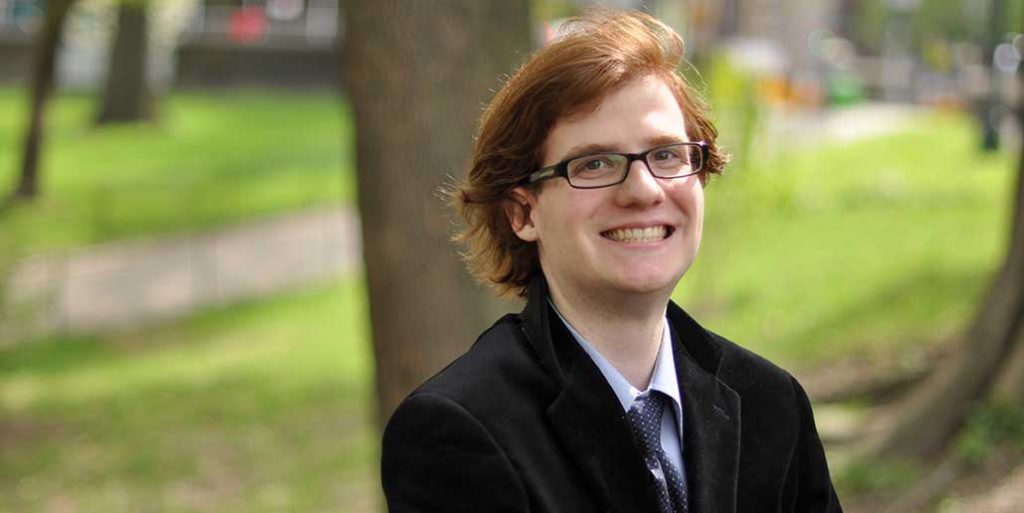Fresh off of winning a prestigious Beinecke Scholarship, Nikolas Oktaba, a Fordham College Lincoln Center senior, has won the University’s fifth highly coveted Gates Cambridge Award.
Upon graduation in May, Oktaba, a classical civilizations and classical languages major, will enroll at Cambridge University to continue studies about how ancient peoples’ sometimes painful questions of identity have had an impact on present-day social and religious life.
“It feels absolutely amazing,” said Oktaba.
“I’m thrilled but also deeply humbled, given that this is one of the most prestigious fellowships in the world.”
The Gates Cambridge scholarship is one of the world’s most competitive, where only 1 in 10 applicants are invited to the interview stage.
Oktaba credited Fordham faculty members Andrew Clark, Ph.D., associate professor of French and comparative literature, Anne Golumb Hoffman Ph.D., professor of English, and the staff of Fordham’s Campion Institute for Prestigious Scholarships for helping him through the application process.
John Ryle Kezel, Ph.D., director of the Campion Institute, called Oktaba’s scholarship win a tribute to both his personal academic excellence and to the University as a whole. Since his sophomore year, Oktaba has worked closely with Mary Shelley, Campion’s assistant director for the Lincoln Center campus, and has taken part in Campion-organized mock interview sessions with faculty drawn from Fordham’s three undergraduate colleges.
In terms of competitiveness, Kezel said the Gates Cambridge is on a par with the Rhodes Scholarship and even involves a further step because students first need to apply directly to their department of choice at Cambridge, and interview there for the scholarship.
Kezel recalls Oktaba as a “remarkable scholar.” During his mock interviews, Kezel said that when someone asked him ‘What’s your favorite Greek poem?’ Oktaba quoted the poem in Greek.
“I’m particularly grateful to Mary Shelley and my staff who worked with Nikolas, and for the continuing support from [Provost] Stephen Freedman and President Joseph McShane, S.J. It really takes a whole University to win such awards.”
Oktaba noted that the classics have historically been at the vanguard of opening contemporary inquiries into questions of sex, gender, and sexuality. He said it is a subject he’s been interested in since childhood, when his mother would take him to the library in Greenpoint, Brooklyn. When he was just 7, he discovered books about classical antiquity next to the books about chivalry, knights, and courtly romances that interested him at the time. One of those, The Twelve Caesars by Suetonius, made a lasting impression on him.
At Fordham, he studied groups such as the Ascetics, who that believed the goal of a man was to become an angel and the goal of a woman was to become a man.
“Because of the temporal distance between 2015 and antiquity, I think it might be easier for many to look at these painful questions as they were asked 2,000 years ago than thinking about them from the 1960s or today,” he said.
“Not only have the classics informed over 2,000 years of talking about identity in the western world and beyond, as recently as 2003, in the Supreme Court case about sodomy, both the plaintiff and defendant were using editions of Plato to support their own arguments.”
The Gates Cambridge Scholarship was established by Bill and Melinda Gates in 2000 and is awarded to applicants from countries outside the United Kingdom to pursue a full-time postgraduate degree at the University of Cambridge. It aims to build a global network of future leaders committed to improving the lives of others. Past Fordham winners have included Rose L. Spear FCRH ’06, Joseph Clair GSAS ’08, Jeremiah Schwarz, FCRH ’03 (who won his in 2008), and Jeffrey Lockhart FCRH ’13,GSAS ’14.

